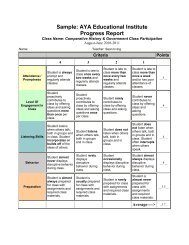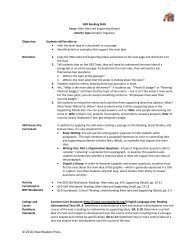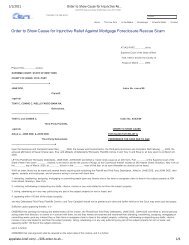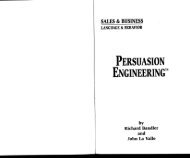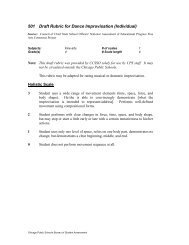Response-Answer to Troutman motion for summary judgment FINAL ...
Response-Answer to Troutman motion for summary judgment FINAL ...
Response-Answer to Troutman motion for summary judgment FINAL ...
Create successful ePaper yourself
Turn your PDF publications into a flip-book with our unique Google optimized e-Paper software.
UNITED STATES DISTRICT COURT FOR THEFOR NORTHERN DISTRICT OF GEORIGAATLANTA DIVISIONCIVIL ACTION FILEWekesa O. Madzimoyo,Plaintiff, }v. }THE BANK OF NEW YORK }No. 1:09-CV-02355-CAP-GGBMELLON TRUST COMPANY, NA., }<strong>for</strong>merly known as The Bank of New }York Trust Company, N.A., JP MORGAN }CHASE BANK, NA, GMAC MORTGAGE, LLC }and ANTHONY DEMARLO, At<strong>to</strong>rneyDefendants. }RESPONSE TO MOTION FOR JUDGEMENT ON THE PLEADINGSCome now the Plaintiff, WEKESA O. MADZIMOYO AND move the Court<strong>to</strong> deny GMAC MORTGAGE, LLC et al, Defendants ‘Motion <strong>for</strong> Judgment on the Pleadings, and in support thereof show the Court asfollows:
STATEMENT OF FACTS1. On March 23, 1999, Plaintiff did obtain a mortgage loan from FT MortgageCompanies d/b/a Equibanc Mortgage Corporation in the principal amount of$140, 6000, which was secured by Plaintiff’s residence at 852 Braffer<strong>to</strong>nPlace, S<strong>to</strong>ne Mountain, Georgia, 30083 (the Subject Property) [Petition Pg.16.]2. Plaintiff disputes the Defendants’ claims that:a. “The servicing rights <strong>for</strong> the loan were transferred <strong>to</strong> HomecomingsFinancial Network on July 6, 1999.” Plaintiff has refused <strong>to</strong> providethe documents that governed such transfer, and this statementcontradicts in<strong>for</strong>mation previously provided by the Defendants (SeePetition, Copies of Defendant’s Letters -Attachment B, April 22,2009.)b. “The servicing rights were subsequently transferred <strong>to</strong> GMACMortgage, LLC (“GMAC”). Plaintiffs have refused <strong>to</strong> provide thedocuments that governed such a transfer and the legal paper trailfrom the original, and/or legal secured credi<strong>to</strong>r.c. “The loan and deed were subsequently assigned <strong>to</strong> JPMorgan ChaseBank and on April 7, 2006, The Bank of New York Mellon Trust
Company, National Association Acquired JP Morgan’s business. Seethe contradiction in GMAC letter dated June 10 th stating thatRESIDENTIAL FUNDING CORP “currently owns interest in youraccount. “ (See Attachment E <strong>for</strong> Copies of Defendants’ Letters.) Todate, Plaintiff has received no proof that his loan and deed <strong>for</strong> theSubject Property executed with FT Mortgage Companies d/b/aEquibanc Mortgage Corporation was indeed legally assigned <strong>to</strong>JPMorgan Chase Bank. Since April 13, 2009, the Plaintiff hasrepeatedly requested, and the Defendants have staunchly refused <strong>to</strong>provide such documentation.a) Defendant claims the Plaintiff filed the instant action on July 29, 2009due <strong>to</strong> the Defendants failure <strong>to</strong> produce the original note. Contrary <strong>to</strong> theDefendant’s version, the Plaintiff filed in an attempt <strong>to</strong> halt the impendingnon-judicial <strong>for</strong>eclosure as required by OCGA § 44-14-162 as theDefendants move <strong>to</strong> <strong>for</strong>eclosure without a proper recording of assignmentsis unlawful according <strong>to</strong> OCGA § 44-14-162.
ARGUMENT AND CITATION OF AUTHORITYPlaintiff opposes Defendants claim that Plaintiff lacks standing without a tender ofarrearages based on the following:1. The Plaintiff did not execute a security deed with any of the Defendantsand does not owe them any money at all. On the contrary, Plaintiff believes thatany money paid <strong>to</strong> the Defendants was obtained fraudulently, and that saidDefendants should be ordered <strong>to</strong> place all such monies with the court pendingthe outcome of this litigation.Even if it were <strong>to</strong> be proven at some future time that the Plaintiff did owe theDefendants, at the time the Plaintiff exercised his right <strong>to</strong> require the debtcollec<strong>to</strong>rs, the Defendants, <strong>to</strong> validate the debt amount and true and securedcredi<strong>to</strong>r, the Plaintiff was not behind on his mortgage payments at all.According <strong>to</strong> FDCPA section §809 (b) “If the consumer notifies the debtcollec<strong>to</strong>r in writing within the thirty-day period described in subsection (a) thatthe debt, or any portion thereof, is disputed, or that the consumer requests thename and addresses of the original credi<strong>to</strong>r, the debt collec<strong>to</strong>r shall ceasecollection of the debt, or any disputed portion thereof, until the debtcollec<strong>to</strong>r obtains verification of the debt or a copy of a <strong>judgment</strong>, or the nameand address of the original credi<strong>to</strong>r, and a copy of such verification or
<strong>judgment</strong>, or name and address of the original credi<strong>to</strong>r, is mailed <strong>to</strong> theconsumer by the debt collec<strong>to</strong>r.”Since the Defendants have refused <strong>to</strong> provide the requisite in<strong>for</strong>mation <strong>to</strong>legally validate the debt amount and secured credi<strong>to</strong>r, the collection of the debt, orany disputed portion thereof ceased. The Plaintiff is not in arrears, and the move <strong>to</strong><strong>for</strong>eclosure by the debt collec<strong>to</strong>r Defendants is unlawful. Just which one of theDefendants are-were debt collec<strong>to</strong>rs is difficult <strong>to</strong> determine precisely because theDefendants have refused <strong>to</strong> provide the clear chain of title as order by DekalbCounty Superior Court Judge Tangela Barry along with the governing agreementsthat would help determine their legal roles (servicer, lender, trustee, credi<strong>to</strong>r,secured credi<strong>to</strong>r, holder in due course, etc.) (See Petition Summons, Page 2.)2. The Defendants consistently and erroneously attempt <strong>to</strong> restate thePlaintiff’s claims <strong>to</strong> read that Defendants’ failure <strong>to</strong> “Produce The Note”gives rise <strong>to</strong> the petition <strong>for</strong> injunctive relief. The Defendants ignore theother requirements <strong>to</strong> establish legal standing and the initial questions askedby the Plaintiff in his attempt <strong>to</strong> determine who the true securecredi<strong>to</strong>r/holder in due course is.After having set up a straw man, the Defendants attack swiftly asserting“that Plaintiff cannot produce a Georgia law requiring “either a lender or its
at<strong>to</strong>rney conducting the <strong>for</strong>eclosure sale” <strong>to</strong> “Produce The Note.”3. Plaintiff holds that OCGA § 44-14-162.2 states that“(a) Notice of the initiation of proceedings <strong>to</strong> exercise a power of sale in amortgage, security deed, or other lien contract shall be given <strong>to</strong> the deb<strong>to</strong>r bythe secured credi<strong>to</strong>r no later than 30 days be<strong>for</strong>e the date of the proposed<strong>for</strong>eclosure.”Given that no sale or assignment of Plaintiff’s property in question had beenrecorded in the DeKalb County Court House since 1999, and since not oneof the Defendants where named on the assignment, and since not one of theDefendants have provided documentation or governing master agreements <strong>to</strong>establish the legal chain of title or other evidence showing them as“credi<strong>to</strong>r,” “secured credi<strong>to</strong>r,” lender or holder in due course, etc, Plaintiffclaims that Defendants are attempting <strong>to</strong> <strong>for</strong>eclose illegally and seeksprotection from the Court.In U.S. Bank National Association v. Ibanez, Massachusetts Land CourtMsc. Case No. 384283 held that the <strong>for</strong>eclosure in Ibanez was invalidbecause the Assignment was both dated and recorded after the sale and the
notices, there<strong>for</strong>e, "failed <strong>to</strong> name the mortgage holder as required by G.L. c.244, §14.4. Defendants claim that Credi<strong>to</strong>rs who collect on their own accounts undertheir own names are not “debt collec<strong>to</strong>rs” <strong>for</strong> purposes of the Fair DebtCollection Practices Act (FDCPA). The FDC PA (§ 803. Definitions- 4)defines “credi<strong>to</strong>r” <strong>to</strong> mean any person who offers or extends credit creatinga debt or <strong>to</strong> whom a debt is owed, but such term does not include any person<strong>to</strong> the extent that he receives an assignment or transfer of a debt in defaultsolely <strong>for</strong> the purpose of facilitating collection of such debt <strong>for</strong> another.It is clear <strong>to</strong> the Plaintiff that HOMECOMINGS FINANCIAL LLC andGMAC collected monies and intended <strong>to</strong> collect monies from the Plaintiff.It is not clear as <strong>to</strong> on whose behalf they were collecting.Typically credi<strong>to</strong>rs argued that they were shielded from liability by the FDCPA's"bona fide error defense," which provides that debt collec<strong>to</strong>rs are not liable <strong>for</strong>FDCPA violations that were "not intentional and resulted from a bona fide errornotwithstanding the maintenance of procedures reasonably adapted <strong>to</strong> avoid anysuch error." 15 U.S.C. § 1692k(c)However, the US Supreme Court on April 21, 2010 ruled 7-2 in Jerman v.Carlisle, McNeelie, RINI, Dramer & Ulrich LPA (No. 08-1200) otherwise <strong>to</strong>making sure that debt collec<strong>to</strong>rs are treated like everyone else when violating afederal statute and that unlawful behavior will not be excused, and will bepunished <strong>to</strong> the fullest extent of the law. Specifically, the Supreme Court held thatthe
i. “bona fide error defense in §1692k(c) does not apply <strong>to</strong> aviolation of the FDCPA resulting from a debt collec<strong>to</strong>r’s incorrectinterpretation of the requirements of that statute.”ii. Given the absence of similar language in §1692k(c), it is fair <strong>to</strong>infer that Congress permitted injured consumers <strong>to</strong> recover damages<strong>for</strong> “intentional” conduct, including violations resulting from amistaken interpretation of the FDCPA, while reserving the moreonerous administrative penalties <strong>for</strong> debt collec<strong>to</strong>rs whose intentionalactions reflected knowledge that the conduct was prohibited. Congressalso did not confine FDCPA liability <strong>to</strong> “willful” violations, a termmore often unders<strong>to</strong>od in the civil context <strong>to</strong> exclude mistakes of law.See, e.g., Trans World Airlines, Inc. v. Thurs<strong>to</strong>n, 469 U. S. 111, 125–126. Section 1692k(c)’s requirement that a debt collec<strong>to</strong>r maintain“procedures reasonably adapted <strong>to</strong> avoid any such error” also morenaturally evokes procedures <strong>to</strong> avoid mistakes like clerical or factualerrors. Pp. 6–12.One of the basic tenets of FDCPA is that credi<strong>to</strong>rs must validate the debt and theirstanding <strong>to</strong> collect it. Defendants steadfastly refused <strong>to</strong> do this and in doing soviolated FDCPA section § 1692 g.For months prior <strong>to</strong> the attempted illegal <strong>for</strong>eclosure, Plaintiff sent letters <strong>to</strong>Defendants (including an Affidavit <strong>for</strong> them <strong>to</strong> Cease and Desist) asking <strong>for</strong>validation of both the alleged debt and their standing <strong>to</strong> collect by providingdocuments governing the myriad of agreements that would clarify their standing.They refused <strong>to</strong> provide the requisite documents. (See Petition Attachments A, B,C.) Most just ignored the request, but one response on Homecomings Financial’sletter-head stated:“The in<strong>for</strong>mation requested is subject <strong>to</strong> business and tradepractices which are proprietary and confidential and willnot be provided.”
While the letter was printed on company letter-head, the letter was unsigned. (SeePetition - Attachment E Copies of Defendants Letters June 22, 2009)CONCLUSIONDefendants statement of the facts <strong>to</strong> support a move <strong>to</strong> Judgment on thePleadings is flawed. The Plaintiff claims based on the July 29 th 2009 filing isnot based on a “produce the note” requirement prohibiting <strong>for</strong>eclosure,instead it is based on the Defendants’ violation of Georgia State and Federallaw, and he continues <strong>to</strong> seek relief. Further, Plaintiff does not oweDefendants any money on my mortgage, so his challenge <strong>to</strong> Plaintiff‘sstanding fails.WHEREFORE, Plaintiff prays that the Court deny Defendant GMACMORTGAGE LLC et al, Defendant’s Motion <strong>for</strong> Judgment on thePleadings. Plaintiff’s answer <strong>to</strong> DEMARLO Motion <strong>for</strong> Judgment has beenanswered separately.
Submitted this __________ day of ________, 2010Wekesa O. Madzimoyo



